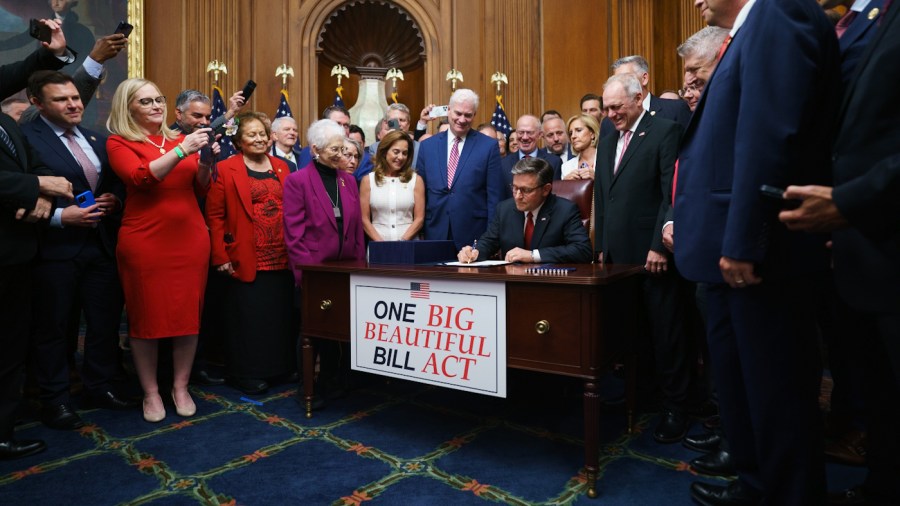America’s greatest threats come from within

On July 4, President Trump signed into law his “One Big Beautiful Bill Act,” a sprawling piece of legislation with a staggering price tag. It will add a projected $3 trillion to $4 trillion to the national debt.
Having just celebrated our independence, it is worth reflecting on what truly threatens America’s future — and it’s not just external enemies or fleeting culture wars. It is, rather, the unchecked growth of our federal deficits and the unraveling of the civic fabric that once bound us together.
Our national debt currently exceeds $36 trillion. If current projections hold, that number could soar to almost $60 trillion in just 10 years. Financial experts, such as Bridgewater’s Ray Dalio, have sounded the alarm warning that sustained interest rates between 5 percent and 7 percent could consume more than half of the federal budget. Indeed, the Congressional Budget Office recently reported that interest on the debt alone could exceed military spending by 2028 and reach $1.6 trillion annually by 2034.
This isn’t just an abstract concern. A weakened fiscal posture poses a threat to every American household. Higher bond yields signal declining confidence in our stewardship, leading to higher borrowing costs across the board. That means more expensive mortgages, car loans, student debt and business financing. Younger Americans, who had no voice in the decisions that created this debt, will bear the heaviest burden.
In our recent book, “What’s Right with America,” we identified two critical threats to our national future, one economic and one social. The first is the growing fiscal irresponsibility of our federal government. The second, perhaps more insidious, is the erosion of civility — the social glue that makes self-governance possible in a diverse republic.
Civility isn’t about agreeing on everything. It’s about preserving the space where disagreement can occur with respect. That space is shrinking. Too often, discourse is dominated by extremes. Pundits profit from outrage, politicians cater to their bases rather than the country, and social media rewards division instead of dialogue. According to Pew Research in September 2023, 84 percent of Americans say that political debate has become less respectful. Meanwhile, Gallup reports that trust in government and media remain near historic lows.
Ironically, if Trump (or any leader) genuinely seeks lower interest rates, the path isn’t through pressuring the Fed or issuing tax cuts we can’t afford. It’s through fiscal discipline.
As high earners, we know from experience that long-term economic health depends more on low borrowing costs and stable markets than marginal tax breaks. We would welcome higher tax rates if they were accompanied by a balanced budget and a credible plan to reduce the debt.
Still, we remain cautiously optimistic. Why? Because this isn’t the first time America has faced a moment of excess. History shows that we eventually course-correct. Whether through the post-Civil War reconstruction, the response to the Great Depression, or the fiscal discipline of the late 1990s, Americans have consistently risen to the challenge when stakes are high.
This moment might spark the reckoning we need — a bipartisan awakening rooted in courage, creativity and a shared sense of responsibility. The growing fiscal crisis may be what finally forces leaders the left and the right to prioritize the long-term national interest over short-term political gain.
Restoring fiscal discipline will also require restoring civility. There can be no meaningful reform without conversation. And conversation requires that we see one another not as enemies but as fellow citizens. That’s not a naive plea for unity. It’s a pragmatic necessity. We cannot govern effectively or build a sustainable future on a foundation of contempt.
America’s strength has never come from government alone. It comes from the ingenuity of its people and the resilience of its institutions — ordinary Americans who serve, build, invent and give. They are the honest stewards of the American dream. And their spirit gives us hope.
The future is not predetermined. If we can summon the political will to enact commonsense fiscal reform and rebuild our civic culture, there’s no reason why America’s next chapter can’t be more prosperous and more unified than the last. But the clock is ticking.
It’s time to step up.
Paul Johnson is a businessman and former mayor of Phoenix. Larry Aldrich, a lawyer, served as CEO of media and healthcare companies. They co-authored “What’s Right with America—And How We Can Keep It That Way!”